![]()
![]()
![]()
Use LEFT and RIGHT arrow keys to navigate between flashcards;
Use UP and DOWN arrow keys to flip the card;
H to show hint;
A reads text to speech;
28 Cards in this Set
- Front
- Back
|
Stress |
The body’s response to a real or perceived threat... meant to get people ready for some kind of action to get them out of danger |
|
|
Psychophysiology |
Refers to the study of the interaction between behaviours and psychological mechanisms and the functioning of the nervous system. |
|
|
Autonomic nervous system (ANS) |
Part of the peripheral nervous system that is responsible for regulating automatic or involuntary functions such as heart rate, blood pressure, and breathing. Controls fight or flight response. |
|
|
Fight-or-flight response |
The body’s response to internal or external stressors and involves the decision to either flee from danger or respond with aggression to protect one’s self. |
|
|
Critical incident stress |
Refers to the psychophysiological, psychological, physical, and emotional reactions that may occur in an individual who has been involved in a traumatic incident. |
|
|
Suicide by cop |
Refers to a situation in which a person wishing to die places an officer in a life-threatening situation in order to force the officers to use deadly force to protect him or herself or other individuals |
|
|
Tired cop syndrome |
Refers to a level of fatigue similar to jet-lag due to shift work that is experienced by police officers. |
|
|
Post-traumatic stress disorder |
Is mental disorder involving exposure to a traumatic event that results in severe and intrusive anxiety- and fear-related symptoms. |
|
|
Secondary traumatic stress (STS) |
Refers to “a set of psychological symptoms that mimic post-traumatic stress disorder, but acquired through exposure to persons suffering from the effects of trauma.” |
|
|
Badge of life |
North American police mental health organization |
|
|
Emotional self-care Training |
A training program designed to teach all officers general coping strategies and stress relief practices
Annual mental health “check ins” |
|
|
Psychological services |
Asses and assist with the mental health functioning and ensure officers can perform their duties both safely and effectively. |
|
|
Fitness-for-duty evaluation (FFDE) |
An investigation of an officer’s emotional stability following a traumatic event or a complaint lodged against him or her by another officer or civilian |
|
|
Critical incident stress management (CISMT) |
A psychological interventions employed by police services for officers experiencing critical stress is a form of debriefing or “mental health first aid” |
|
|
4 general categories of stress associated with policing |
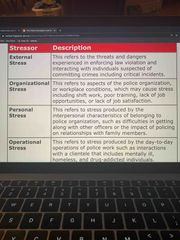
Back (Definition) |
|
|
Psychological Effects of Critical incident stress |
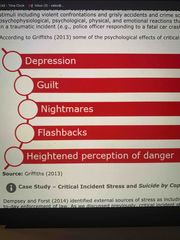
Back (Definition) |
|
|
Research policing and fatigue |
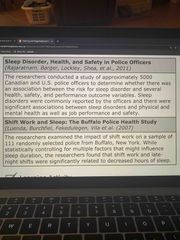
Back (Definition) |
|
|
Stress felt by family members |
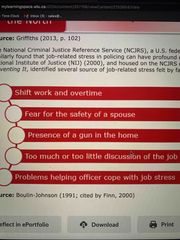
Back (Definition) |
|
|
Examples of personal stressors |
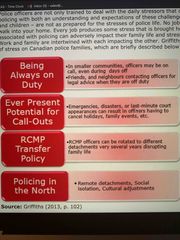
Back (Definition) |
|
|
Effects of police stress |
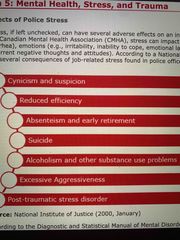
Back (Definition) |
|
|
Research policing and PTSD |
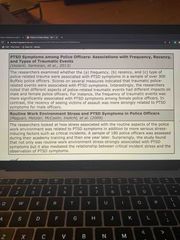
Back (Definition) |
|
|
Symptoms of PTSD |
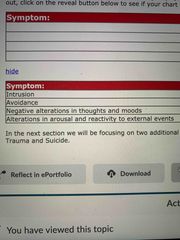
Back (Definition) |
|
|
Traumatic incidents in policing |
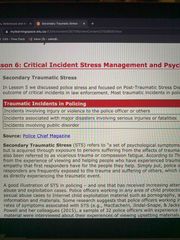
Back (Definition) |
|
|
Protective and risk factors for suicide |
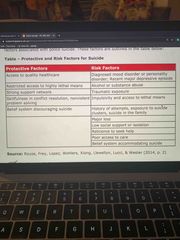
Back (Definition) |
|
|
Badge of Life suicide prevention |
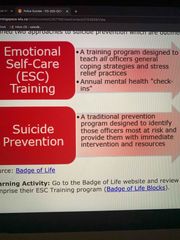
Back (Definition) |
|
|
Categories of psychological services in law enforcement |
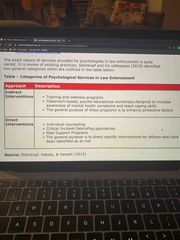
Back (Definition) |
|
|
The IACP standards for FFDE |
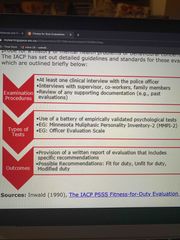
Back (Definition) |
|
|
Goals of CISMT |
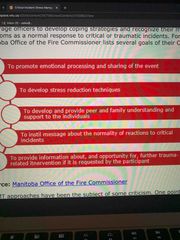
Back (Definition) |

